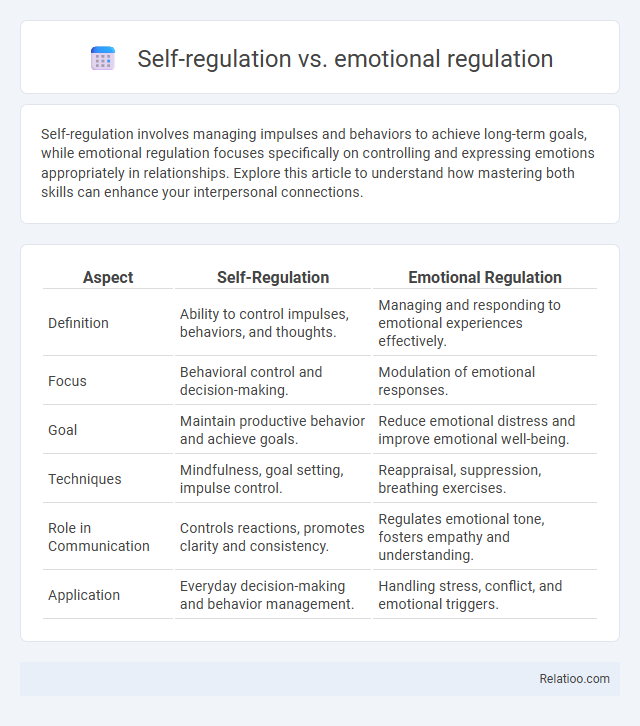Self-regulation involves managing impulses and behaviors to achieve long-term goals, while emotional regulation focuses specifically on controlling and expressing emotions appropriately in relationships. Explore this article to understand how mastering both skills can enhance your interpersonal connections.
Table of Comparison
| Aspect | Self-Regulation | Emotional Regulation |
|---|---|---|
| Definition | Ability to control impulses, behaviors, and thoughts. | Managing and responding to emotional experiences effectively. |
| Focus | Behavioral control and decision-making. | Modulation of emotional responses. |
| Goal | Maintain productive behavior and achieve goals. | Reduce emotional distress and improve emotional well-being. |
| Techniques | Mindfulness, goal setting, impulse control. | Reappraisal, suppression, breathing exercises. |
| Role in Communication | Controls reactions, promotes clarity and consistency. | Regulates emotional tone, fosters empathy and understanding. |
| Application | Everyday decision-making and behavior management. | Handling stress, conflict, and emotional triggers. |
Introduction to Self-Regulation and Emotional Regulation
Self-regulation involves controlling your thoughts, emotions, and behaviors to achieve long-term goals, while emotional regulation specifically targets managing intense or negative emotions effectively. Understanding the differences between self-regulation and emotional regulation is crucial for developing better coping strategies and enhancing overall mental well-being. Emotional regulation focuses on calming emotional responses, whereas self-regulation encompasses a broader range of self-control skills, including impulse control and attention management.
Defining Self-Regulation
Self-regulation is the capacity to manage one's thoughts, emotions, and behaviors in pursuit of long-term goals, integrating cognitive control and emotional responses. Emotional regulation specifically targets the ability to modulate emotional reactions, shaping how feelings are experienced and expressed. Unlike emotional regulation, which centers on managing feelings, self-regulation encompasses a broader spectrum of processes, including impulse control, attention management, and behavioral adaptation.
Understanding Emotional Regulation
Understanding emotional regulation involves recognizing the processes by which individuals monitor, evaluate, and modify their emotional reactions to achieve adaptive outcomes. Self-regulation broadly encompasses controlling one's thoughts, emotions, and behaviors, while emotional regulation specifically targets managing emotional experiences and expressions. Effective emotional regulation strategies include cognitive reappraisal, mindfulness, and stress management techniques that help maintain psychological well-being.
Key Differences Between Self-Regulation and Emotional Regulation
Self-regulation encompasses controlling impulses, emotions, and behaviors to achieve long-term goals, while emotional regulation specifically refers to managing and modifying emotional responses. Key differences include self-regulation's broader scope covering cognitive and behavioral adjustments, whereas emotional regulation focuses solely on influencing emotional intensity and expression. Emotional regulation techniques, such as reappraisal or suppression, serve as tools within the larger framework of self-regulation strategies.
The Role of Self-Regulation in Daily Life
Self-regulation encompasses the ability to control impulses, manage behavior, and maintain focus, which is essential for achieving long-term goals and adapting to social environments. Emotional regulation specifically involves managing and responding to emotional experiences effectively to reduce stress and promote mental well-being. The role of self-regulation in daily life is critical for decision-making, maintaining interpersonal relationships, and enhancing productivity through sustained attention and emotional control.
The Importance of Emotional Regulation for Mental Health
Emotional regulation plays a crucial role in maintaining mental health by enabling you to manage your responses to stress, anxiety, and negative emotions effectively. While self-regulation encompasses controlling impulses and behaviors, emotional regulation specifically targets your ability to identify, understand, and modulate emotional experiences. Mastering emotional regulation reduces the risk of mood disorders and enhances overall psychological resilience and well-being.
Strategies to Improve Self-Regulation
Self-regulation involves managing your thoughts, emotions, and behaviors to achieve long-term goals, while emotional regulation specifically targets controlling emotional responses. Strategies to improve self-regulation include practicing mindfulness, setting clear goals, and developing coping mechanisms such as deep breathing or cognitive restructuring. Strengthening these skills helps you maintain focus, reduce impulsivity, and enhance decision-making in challenging situations.
Techniques to Enhance Emotional Regulation
Techniques to enhance emotional regulation include mindfulness meditation, cognitive reappraisal, and deep breathing exercises, which help individuals manage their emotional responses effectively. Practicing self-regulation involves setting personal goals, monitoring impulses, and using adaptive strategies to maintain control over behavior in challenging situations. Emotional regulation focuses on identifying, understanding, and modifying emotional reactions to improve psychological resilience and interpersonal relationships.
Self-Regulation vs Emotional Regulation in Childhood Development
Self-regulation in childhood development refers to a child's ability to manage impulses, emotions, and behaviors in various situations, while emotional regulation focuses specifically on controlling and expressing emotions appropriately. Your child's self-regulation skills influence their social interactions, academic success, and overall mental health by integrating emotional regulation with cognitive and behavioral control. Developing both self-regulation and emotional regulation supports resilience, problem-solving skills, and emotional intelligence essential for lifelong development.
Integrating Both Skills for Holistic Well-being
Self-regulation and emotional regulation are critical skills that work together to enhance your overall well-being by managing impulses and emotional responses effectively. Integrating both skills fosters resilience, improves decision-making, and promotes mental health by enabling you to navigate complex situations with emotional balance and self-control. Developing this holistic approach supports sustained personal growth and strengthens your ability to cope with stress and adversity.

Infographic: Self-regulation vs Emotional regulation
 relatioo.com
relatioo.com